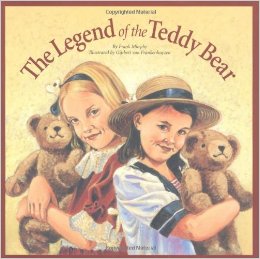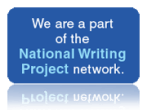Teacher to Teacher: A Journey with a Mentor Text
by Lynne R. Dorfman
 I am always amazed how much fun I have rediscovering the joy of studying a new read as a mentor text. In this case, as I am reading and rereading Take a Hike, Teddy Roosevelt – the newest book by author Frank Murphy, I am thinking about the first time I met Frank fifteen years ago. Now a fellow of the Pennsylvania Writing & Literature Project and a personal friend I know well, I remember that Rose Cappelli and I had absolutely no idea who Frank was the summer day he arrived at our PAWLP Author Study course on the West Chester University campus to present his books, Ben Franklin and the Magic Squares and The Legend of the Teddy Bear. Chris Coyne Kehan had recommended him, and we trusted Chris’s judgment. Frank was personable and exciting to listen to, but he completely won us over when he spied our copy of Wondrous Words by Katie Wood Ray. Clutching it in both hands he declared, “I used this book to write my own!” Indeed, Katie Wood Ray is one of our mentors for our books about mentor texts (along with Ralph Fletcher, Shelley Harwayne, and Regie Routman).
I am always amazed how much fun I have rediscovering the joy of studying a new read as a mentor text. In this case, as I am reading and rereading Take a Hike, Teddy Roosevelt – the newest book by author Frank Murphy, I am thinking about the first time I met Frank fifteen years ago. Now a fellow of the Pennsylvania Writing & Literature Project and a personal friend I know well, I remember that Rose Cappelli and I had absolutely no idea who Frank was the summer day he arrived at our PAWLP Author Study course on the West Chester University campus to present his books, Ben Franklin and the Magic Squares and The Legend of the Teddy Bear. Chris Coyne Kehan had recommended him, and we trusted Chris’s judgment. Frank was personable and exciting to listen to, but he completely won us over when he spied our copy of Wondrous Words by Katie Wood Ray. Clutching it in both hands he declared, “I used this book to write my own!” Indeed, Katie Wood Ray is one of our mentors for our books about mentor texts (along with Ralph Fletcher, Shelley Harwayne, and Regie Routman).
 As I look through the pages of Frank’s newest book, I am struck by the way he scaffolds his informational text – exact nouns such as bison, refuge, sanctuaries, natural resources, badger, wildlife, zoology, and frontier help carry the reader through the pages of print. He does not shy away from proper nouns either, referring to Mount Rushmore, the Grand Canyon, Governor Fish, the American West, and New York City. Proper nouns help establish the author as an expert, giving him the voice of authority. Strong verbs are the muscles of a piece of writing, and I see verbs like observed, bothered, declare, protected, studied, roamed, raised, tipped, and suffered. What becomes apparent to me is the scarcity of adjectives. Frank sprinkles a few well-placed describing words throughout the text such as “snapping” to describe turtle or “national” to describe treasure. I am again amazed that this text does not need an abundance of adjectives and adverbs – the nouns and verbs do the job very well. I am thinking here that economy of expression is something I need to help my students understand and be able to do.
As I look through the pages of Frank’s newest book, I am struck by the way he scaffolds his informational text – exact nouns such as bison, refuge, sanctuaries, natural resources, badger, wildlife, zoology, and frontier help carry the reader through the pages of print. He does not shy away from proper nouns either, referring to Mount Rushmore, the Grand Canyon, Governor Fish, the American West, and New York City. Proper nouns help establish the author as an expert, giving him the voice of authority. Strong verbs are the muscles of a piece of writing, and I see verbs like observed, bothered, declare, protected, studied, roamed, raised, tipped, and suffered. What becomes apparent to me is the scarcity of adjectives. Frank sprinkles a few well-placed describing words throughout the text such as “snapping” to describe turtle or “national” to describe treasure. I am again amazed that this text does not need an abundance of adjectives and adverbs – the nouns and verbs do the job very well. I am thinking here that economy of expression is something I need to help my students understand and be able to do.
I study the lead paragraph. Frank uses historical facts, a character snapshot, and refers to the way his biographical character is known. There is a clear statement of purpose that focuses the reader on the slice of life that Frank will develop. I love the way he makes his character personable right away by letting us know that Americans called this president “Teddy.” He uses an informal tone and directly addresses his readers: “You might not recognize this guy.” His purpose statement is clear. We are ready to focus on Teddy’s work as an environmentalist and why he deserved to have his face carved into Mount Rushmore along with George, Tom, and Abe.
So many things about this mentor text grab me and hold me there as a reader such as the interesting anecdotes Frank has uncovered and shares with his young readers (target grade level for readability is third grade). What kid would not laugh in delight at the story of the frog leaping off Teddy’s head as he removes his hat to tip a respectful hello to Governor Fish and his wife as they pass him in their carriage! Students will enjoy the description of Teddy’s bedroom as a child and understand why he appropriately called it “Roosevelt Museum of Natural History.”
I love the opportunities to study sentence fluency across the pages of this book. Frank writes with pairs to establish balance and rhythm in a sentence such as, “His frogs and snakes escaped from boxes and buckets.” I find examples of sentences with compound subjects, others with compound predicates, compound, complex, and even a compound-complex sentence – such rich variety with so many structures to study and imitate! There are two well-chosen examples of fragments to talk about with students and a variety of punctuation marks including dashes, hyphens, comma use, quotations use, and apostrophe use. Frank cleverly uses variation in print to highlight the word “big” in sentences such as, “Teddy wanted to do BIG things one day.” His use of effective repetition with the word “big” in all capital letters as well as the phrase “take a hike” help to establish a thread that pulls us through the text just as Theseus used a ball of thread Ariadne gives to him to find his way out of the labyrinth. The use of effective repetition helps struggling readers, too. It is a comfort – something that is instantly recognized and helpful. In this case, there is no doubt that Teddy will do BIG things throughout his life, culminating in the establishment of national parks, bird sanctuaries, and national forests.
This biography is a work that can inspire young writers and readers. Certainly, we can relate the content to current environmental issues and concerns. I am struck by how much I learned about writing an informational text for children – how Frank’s transitions and content help our elementary school readers move from page to page, how the friendly tone and variety of sentence structures make this text so easy to read, and yet….there is so much to think about, talk about, write about. Thank you, Frank, for a wonderful journey into a mentor text! If you want to “take a hike” with Teddy and Frank, read Take a Hike, Teddy Roosevelt! Enjoy!
 Lynne R. Dorfman is a Co-director of the Pennsylvania Writing & Literature Project. She believes that attending her 1989 summer institute on the teaching of writing was one of the best things she ever experienced as an educator. It changed the way she thought about writing, reading, and learning forever!
Lynne R. Dorfman is a Co-director of the Pennsylvania Writing & Literature Project. She believes that attending her 1989 summer institute on the teaching of writing was one of the best things she ever experienced as an educator. It changed the way she thought about writing, reading, and learning forever!




Lynne,
Thank you for highlighting Frank’s rhetorical moves – and just as important — thank you for pointing out the “Big Idea/s” in his latest book: preserving and sustaining the environment.
Mary
LikeLike